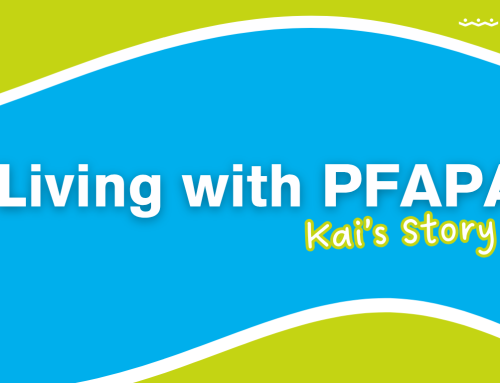
Alison Legge:
Navigating the workplace with a rheumatic disease, Part 2
Earlier this year, we heard from Alison, who shared her story about navigating the workplace with a rheumatic disease. Now in her new role, Alison shared an update with us about her journey, and how what she has been through over the last few months has shown her that she made the right decision.
Alison’s story reminds us that invisible illnesses, like arthritis and other rheumatic diseases, can be difficult to navigate in the workplace and that it is important to advocate for accommodations and support when needed. We’re so honoured that we are able to share her story this #InvisibleDisabilityAwarenessWeek, to help raise awareness on how resources, support, and accommodation are needed to create more inclusive workspaces where everyone can thrive and participate to the best of their ability.
I left my job last March after they mishandled my medical exception request to their Return-to-Office policy. At the time, I had a great new opportunity lined up, but I still struggled with self-doubt. I spent countless sleepless nights asking myself, ‘Did I make the right choice?’ ‘Was the pay cut worth it?’ ‘Was all this for nothing?’ and worst of all, ‘Was I just overreacting?’ It had been over five years since my last major flare and while frequent doctor’s appointments were annoying, they didn’t really interfere with my work. I felt like some friends and former colleagues were judging me for making a big deal out of nothing – probably because I was judging myself.
Today, I can confidently say that the fight was worth it. It took a bad flare, a four-month battle with the NHS, and a change in medication, but now I fully understand what workplace flexibility truly means and why I fought so hard to get it.
My symptoms started gradually in March – a sore foot when I was running, and some mornings I couldn’t make a fist. At first, I did my best to ignore it, but the fatigue that followed couldn’t be brushed off. I convinced myself it was depression, thinking it would be easier to treat than convincing my doctor to adjust my arthritis medication. I figured I could force myself back to feeling better. I cut high-intensity exercise, stopped drinking, and focused on getting enough sleep. But by mid-May, despite all my best efforts, things only got worse. I stopped exercising completely and went from waking up at 7:15 every morning to barely managing to get out of bed for my 9:30 meetings. I had no energy left. After months of denial, I finally accepted that this wasn’t something that would go away on its own.
From May to August, every aspect of my life was consumed by this flare. I was tired, I was in pain, and I was scared. My arthritis has never been easily detectable through physical exams or MRIs, making it difficult to treat and often leaving both my doctors and myself questioning whether the pain was real. Even before seeing a doctor, I knew it would be an uphill battle, likely requiring an MRI that might not show anything conclusive. To the doctors, my disease may have appeared manageable compared to other patients – and maybe that’s true – but it didn’t change the fact that my life felt completely upended.
For four months, I felt like I was stuck in limbo. In the grand scheme of things, four months isn’t a long time, but while I was going through it, it felt like an eternity – especially when the only way to reach the clinic was via email, with response times ranging from 2-5 business days. I also knew there was a good chance my MRI results would come back normal, and my doctor could decide to not change my medication at all. During that time, I obsessively watched my inbox, jumping every time I saw a new email, not knowing if it would bring relief or disappointment. Needless to say, May to August were not my most productive months at work. I often started work after 10 am, took naps during lunch, and cancelled meetings regularly. Many days, the most I could manage was replying to a few Teams messages with, “I’ll get back to you in a few days.” I constantly felt like I was letting everyone around me down, but there was nothing I could do about it.
In early July, there was a particularly tough week where I wanted to go home, but I wasn’t sure how it would work with my job. I had mentioned to my manager that I was struggling with my health but hadn’t explained just how bad things were. One afternoon, I called him while on the verge of tears and told him things were bad and that I might need to go home. I asked if that would be okay. He didn’t press for more details; instead, he reassured me, saying he trusted me and that if I was even considering going home, things must be serious. He also said that in the coming months, as I worked on getting my health under control, there would be moments where I start to doubt myself (and he was right). In those moments, he told me, I needed to listen to him, not the voice inside my head.
It took 15 months, but finally, I understood that everything I had fought for at my last job had a purpose.
I didn’t fight so hard for flexible work because I wanted to sleep in or go to the gym at lunch. It wasn’t even about fitting doctor’s appointments into my workday. For me, living with arthritis means that there may be days, weeks, or even months when I’m not as productive. But I know that those moments are fleeting – and once my disease is back under control, I show up and make up for lost time and then some, because I’m genuinely happy to be there. I do my best work when I have the flexibility to do so in a way that works for me. That might mean I work 20 hours one week but 60 hours the next. It requires trust from those I work with, especially my manager, but I believe I make it worth their while. Ultimately, staying at my last company was never an option for me. Even with a flexible work exception, the overall culture and management trust in flexible work just wasn’t there. I know I never would have survived going through a flare while working there.
In September I changed my medication and four weeks later I went for my first run. I’m back to early mornings and productive workdays, and I’m feeling like me again. Not a day goes by when I don’t feel grateful to have ended up where I am with the manager I have, and that motivates me to do my best work. I can now say with confidence that leaving my last job was the right decision, as their policy meant I could no longer perform at my best. It took some time, but I no longer feel anger or resentment; instead, I see it as their loss.









Leave A Comment